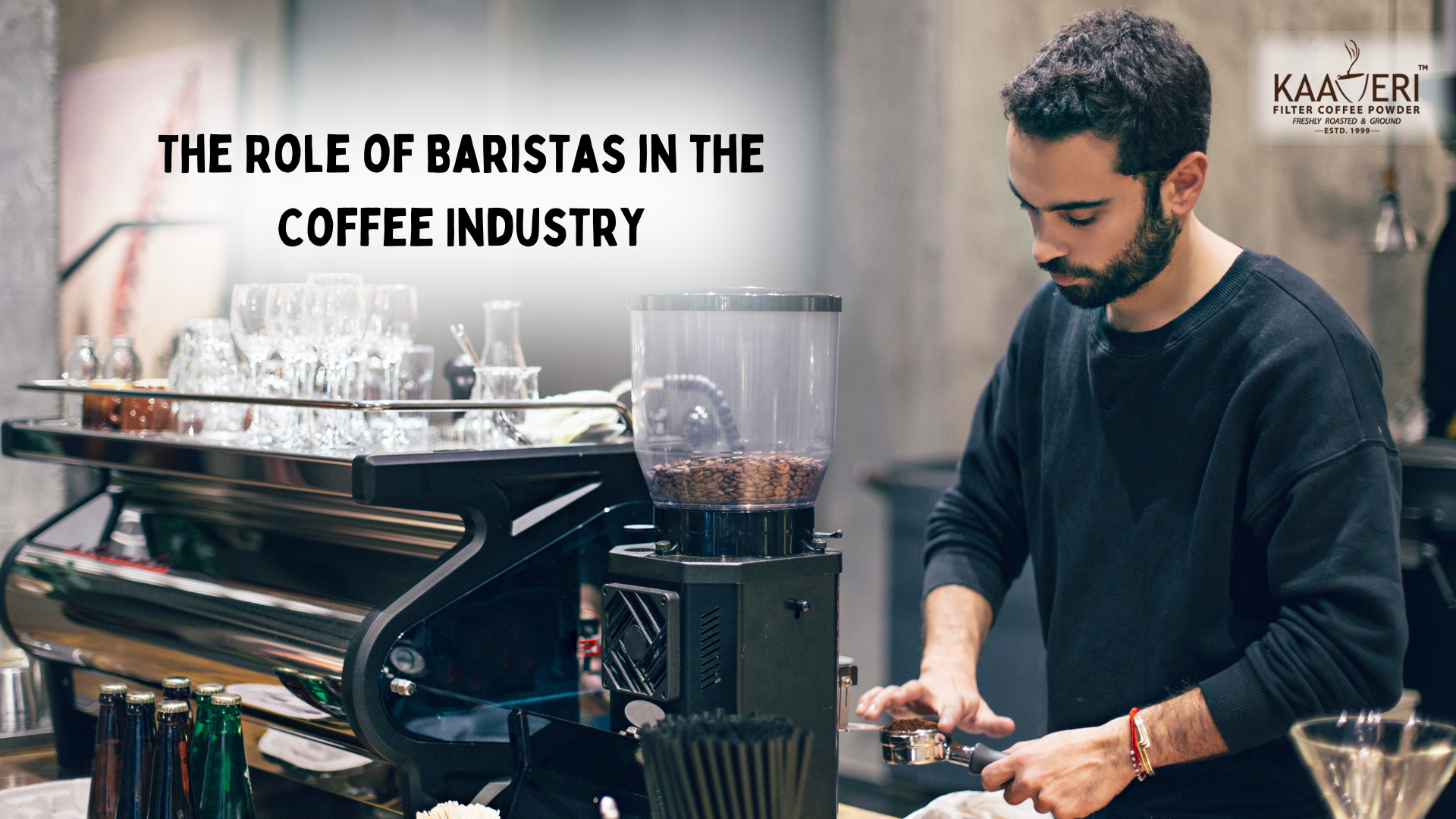
The Role of Baristas in the Coffee Industry
Table of Contents:
| Sl. No | |
| 1 | Introduction |
| 2 | Masters of Brewing Techniques |
| 3 | Creators of Coffee Art and Experience |
| 4 | Educators of Coffee Knowledge |
| 5 | Customer Service and Relationship Building |
| 6 | Innovators in Coffee Trends |
| 7 | Frequently Asked Questions |
Introduction
Baristas play a pivotal role in the coffee industry, often serving as the face of the cafe experience. They are not just responsible for brewing and serving coffee, but they also act as key players in elevating the art of coffee-making and connecting consumers to the wider coffee culture. As the demand for speciality coffee grows, so does the importance of skilled and knowledgeable baristas. In this blog, we explore the multifaceted role of baristas and their contribution to the coffee industry.
Masters of Brewing Techniques
One of the most critical responsibilities of a barista is mastering various brewing techniques. From espresso machines to pour-over setups, baristas must be well-versed in different brewing methods to ensure the best possible cup for every customer. The precision required in grinding beans, measuring doses, and timing extractions showcase the skill that goes into crafting each drink. Speciality coffee shops, in particular, strongly emphasise the barista’s technical abilities to highlight the unique flavour profiles of different coffee beans.

Exploring Plant-Based Milk Alternatives
In recent years, plant-based milk options have grown in popularity. For those who are lactose intolerant or prefer vegan options, almond milk, soy milk, oat milk, and coconut milk offer fantastic alternatives. Oat milk is particularly popular due to its creamy consistency, which closely mimics that of dairy milk, making it ideal for frothy coffee drinks. Soy milk offers a slightly nutty flavour, while almond milk is light and perfect for those who prefer a less creamy texture. Coconut milk, on the other hand, adds a tropical twist with its mild sweetness.

Creators of Coffee Art and Experience
Beyond brewing, baristas are artists in their own right, creating visually appealing beverages that enhance the customer experience. Latte art has become a hallmark of many coffee shops, with baristas pouring intricate designs into each cup. This attention to detail and presentation elevates coffee from a simple drink to an experience. Baristas also play a role in setting the mood and atmosphere of the cafe, acting as ambassadors of the coffee culture and guiding customers through their coffee journey.

Educators of Coffee Knowledge
A great barista is also an educator. With the rise of third-wave coffee culture, customers are increasingly interested in learning about the origins of their coffee, the roasting process, and how brewing methods affect flavour. Baristas help bridge this gap by sharing their knowledge about the beans, their sourcing, and the intricate process behind each cup. Through these interactions, baristas foster a deeper appreciation for coffee and its complex flavours.

Customer Service and Relationship Building
Customer service is at the heart of the barista’s role. Baristas often build relationships with regular customers, learning their preferences and creating personalised experiences. Their ability to engage with customers, remember their orders, and provide recommendations fosters a sense of community within the cafe. The best baristas are not only skilled in making coffee but are also warm, friendly, and capable of creating a welcoming environment that keeps customers coming back.

Innovators in Coffee Trends
Baristas often find themselves at the forefront of coffee innovation, experimenting with new flavours, techniques, and brewing methods. Whether it’s crafting a seasonal drink, introducing a new type of milk, or developing a unique blend, baristas contribute to the evolving trends in the coffee industry. Many cafes encourage their baristas to participate in coffee competitions and workshops, where they can showcase their creativity and push the boundaries of traditional coffee-making.

Frequently Asked Questions (FAQs)
Q: What skills do you need to be a barista?
A barista needs technical skills in coffee brewing, excellent customer service, knowledge of coffee origins and varieties, and the ability to work efficiently in a fast-paced environment.
Q: How does a barista contribute to the coffee shop experience?
Baristas shape the overall customer experience by brewing high-quality coffee, engaging with customers, offering recommendations, and creating a welcoming atmosphere.
Q: What is third-wave coffee, and how does it relate to baristas?
Third-wave coffee refers to a movement that treats coffee as an artisanal product rather than a commodity. Baristas in this movement emphasise high-quality beans, precise brewing methods, and customer education about the nuances of coffee.
Q: Can baristas influence coffee trends?
Yes, baristas often play a role in creating and popularising new coffee drinks, brewing methods, and flavour combinations, helping to drive coffee trends forward.


No Comments